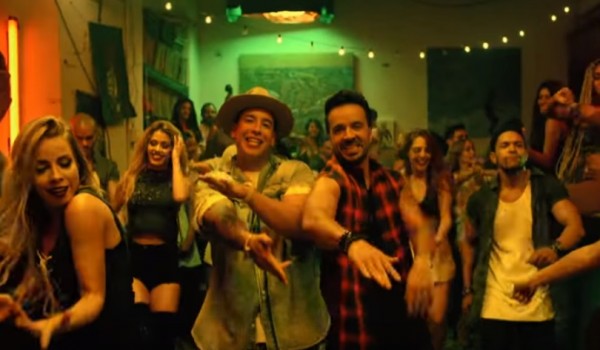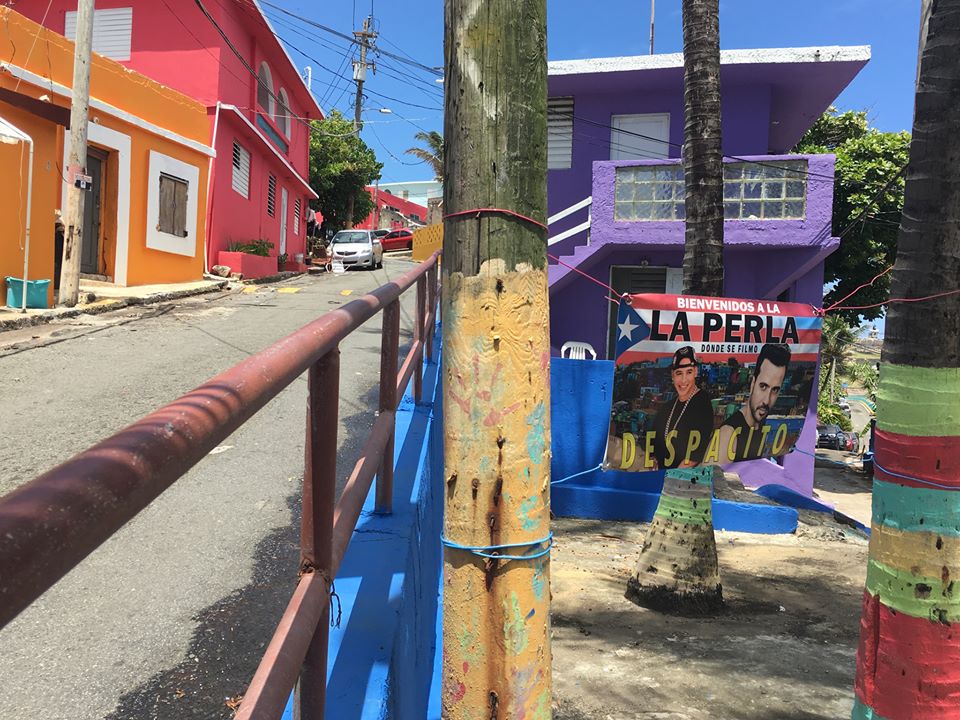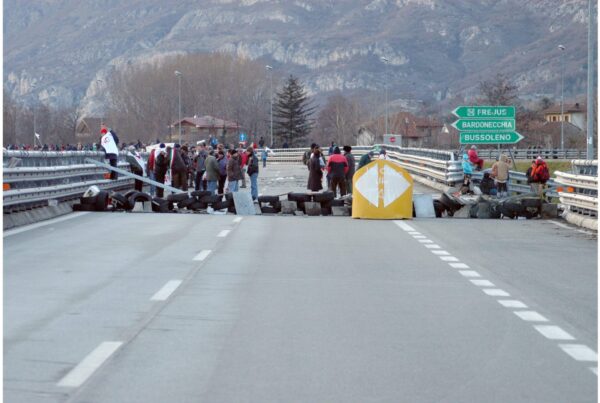This summer’s hit, Despacito, soon to be the most streamed song in history, hides much more than what it says. Its celebratory attitude about Puerto Rico’s ‘paradisiac’ and ‘sexy’ geographies silences the many layers of oppression and violence that the oldest colony in the world has suffered historically, as well as the unprecedented crisis and austerity dictatorship it faces today.
Gustavo García-López* and Irina Velicu**
Kings of reguetón, Daddy Yankee and Luis Fonsi produced the 2017 summer hit Despacito, #1 single in Billboard’s charts and soon to be the most streamed song in history (with nearly 3 billion views on Youtube) at a time when Puerto Rico is still the oldest colony on Earth and going through the worst crisis in its history. We discuss how this hit is heavily politically, both by what it says and by what it silences. After all, who says that politics cannot be ‘sexy’? The song is definitely sticky – as this parody of Italian comedians demonstrate – even when played annoyingly on the radio. It is made following the music industry rules of “summer hits” line by line. This pure-entertainment-no-politics song is supposed to be the savior of Puerto Rico’s economy or simply “wishful thinking” (op-ed article in The Washington Post).

What crisis? Everyone cannot stop singing and dancing in Puerto Rico. Source: Latinpost.com
Despacito conveys the official story of a successful paradisiac “enchanted island” (the official tourist motto in PR for many years), where sensuous, almost-naked colorful ‘natives’ play and dance happily – and freely – in the tropical streets surrounded by the sea, and where musicians can ‘make it big’ and have their ‘blin-blin’. As Sherrie Baver and Barbara Lynch noted in Beyond Sand and Sun, the narrative of paradise in the Caribbean has historically served as a ‘screen’ for hiding socio-economic inequalities and systematic dispossession. The song obscures the current situation of Puerto Rico by promoting a celebratory attitude about the island and its dictatorship of money, silencing the many layers of oppression and violence that the island has been a victim of throughout time.
La Perla, the barrio where the song was filmed, is a poor and mostly black community in the hillside between the beach and the now highly touristic and increasingly gentrified historical San Juan islet (or ‘Old San Juan’). It has long been a forgotten and even persecuted community by governments, threatened by expropriations to give way to luxury residences and supposedly ‘walkable’ city proposals in which the likes of Donald Trump were involved. Despacito sings nothing about this, instead it celebrates the ‘beauty’ and apparent normality of this destitute community, portraying it as a desirable tourist spot. And indeed, don’t tourists like to visit urban food deserts and low-quality life style? After all, Americans visiting are used to the cheap fast-food they usually consume and could not possibly question their own standards of living.

La Perla seen from above. Source: The Guardian
The song is already leading to tours that redefine the community itself and its spaces. For instance the area around the seawall is now known as “Luis (Fonsi)’s rocks” and “Despacito coast” in tourist brochures. Community leaders welcome this as an opportunity to leave behind the invisibility and bad reputation of La Perla as a ‘dangerous’ place and to build a tourism-oriented business. Yet as research has demonstrated (e.g. here and here), this form of tourism tends to foster gentrification and to idealize a non-existent reality. Poverty has never looked so pretty, as a political commentator noted on Facebook. Contrast this to the song La Perla by the Calle 13 duo and salsa icon Ruben Blades, which was not merely filmed in the community but also honored its working class people and struggles, produced as disposable by the violence of state policies and urban gentrification. However, justice does not sell, it does not sound ‘sexy’ for the masses of consumerist tourists and Puerto Ricans who internalized colonial violence.
Just a few months after the hit was launched, massive protests against austerity happened in PR and all Fonsi and Yankee could muster were ambiguous messages: “With Puerto Rico always, I want the best for you and for our people” and “I live with the hope that our future will be brighter, let’s move forward united” . In contrast, other artists like Residente (from the duo Calle 13) and Sie7e marched alongside other protesters. Silence says a thousand words, as the Puerto Rican folk goes: el que calla otorga.

Entrance to La Perla, where banner now reads: “Welcome to La Perla, where Despacito was filmed”. Source: Facebook
On the one hand, Fonsi and Yankee’s silence is motivated by public relations (i.e, monetary) considerations and is directly related to the success of Despacito, since as noted in a recent article, the industry’s rules about mega-hits require artists to avoid controversial positions. Indeed Despacito is popular precisely because it fetishizes the joy of natives abandoned by a deliberately left-unclear non-independent/non-US regime: perhaps tourists also want to indulge in these joys themselves, waiting for more than an hour for a bus that may never come, going to public schools or clinics excluded from investments, barely walking (better driving!) through dead urban areas, and eventually out-migrating in hundreds of thousands. It is not clear why, like elsewhere, governments continue to exist besides supporting corporate interests, for which even the access to a beach should have a price.
On the other hand, this apparently apolitical stance is also is a smokescreen for both singers’ conservative ideology: they explicitly condemned the Venezuelan President Nicolás Maduro for using an altered version of the song in a contested electoral campaign. Facebook users called them out for their hypocrisy in criticizing Venezuela’s elections while keeping silence about the fiscal dictatorship in their own country, where all decisions are made by a non-elected Fiscal Control Board and a US federal judge. These singers are also seen as just another type ofexploiters of the island’s culture and environment for their own financial benefit. Ironically, , while La Perla continues to be marginalized and while people only start to suffer more following massive public cuts, the government recently announced that Fonsi will get a $700,000 contract with the tourism department to use Despacito for promotional advertisement. Surely, if he cared so much for Puerto Rico’s future, instead of his personal enrichment and lavish lifestyle, he could have forgone this money as a contribution to Perla at least.

Protest against the Fiscal Control Board and the austerity dictatorship. The banner reads: “Our future is in debt”
More so, the American flag on Yankee’s cap (and his artist name) are not by chance: he has long been involved in right-wing politics. In 2008 he publicly endorsed conservative American presidential candidate John McCain. At the same time, he was chosen as moderator in the local Puerto Rican elections, and led a campaign called “vote or shut up”. While supposedly aiming to promote youth to vote, this was a highly problematic message that reduced politics and democracy to elections, and further implied that those who did not vote would lose their right to speak out about public issues. Not coincidentally, Yankee’s campaign happened at the same time with the small but highly visible artist collective (Papel Machete) campaign to vote for “None” (Ninguno) with slogans like “None knows your situation, None works in the factory like you, None has the solution, None keeps the promises”. The best response to Yankee came from rapper Sietenueve whose song “Shut up” criticized the endorsement of a war-mongerer like McCain and the use of Puerto Ricans as “cannon meat” for imperialist purposes.

Papel Machete’s campaign for Ninguno. Source: Primera Hora.
Despacito’s hidden messages and problematic commercial misrepresentations of the colony can be best observed in some of the parodies that lay citizens have made of the song. In one of them, Pelaito (Broke), two men sing about their economic woes and complain about the government, highlighting Puerto Rico’s crisis and its culprits, and offering a contrast with the opulent lives of artists like Fonsi and Yankee. But perhaps the most poignant one is Ladroncito (Little Thief), which uses the same video of Despacito but substitutes Fonsi and Yankee’s heads and their lyrics with those of the island’s governor and the president of the Fiscal Control Board, talking about how they are stealing from Puerto Rico. Enjoy the absurd values media is promoting in juxtaposition of ‘paradise’ images with the country’s political-economic reality: the governor and the board president sing “pasito a pasito, suave suavecito, nos vamos tumbando chavito a chavito… nos clavamo’ al pueblo poquito a poquito” (“step by step, little by little, we steal your money…we fuck the people”), while everyone dances along. Perhaps the Spanish colonizers were right: baile, botella y baraja (dance, drink and cards), is the way to rule a colony.
* Gustavo García López is an Assistant Professor in Environmental Planning at the Graduate School of Planning, University of Puerto Rico – Rio Piedras, and a member of the ENTITLE collective. He works on the politics of collective action in commons and environmental movements.
** Irina Velicu is an FCT Postdoctoral researcher at the Center for Social Studies, University of Coimbra, and a member of the ENTITLE collective. She works on the intersections between critical theory and environmental justice.






7 Comments